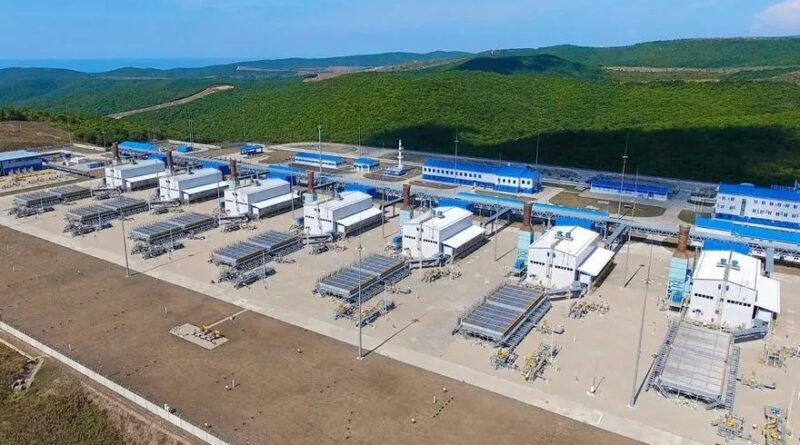Gas Disruptions, Geopolitics, and the Battle for Europe’s Supply
Following the cessation of Russian gas transit through Ukraine, the gas battles waged by Russia have escalated into full force. A ship from Russia’s so-called “dark fleet” has been observed circling above the pipeline that supplies Norwegian gas to Poland. Meanwhile, Ukrainian drones have targeted one of the most critical assets of the Russian gas industry—the Russkaya compressor station. This station is essential for boosting gas pressure to 280 bars before it enters the Black Sea section of the TurkStream pipeline for its 900-kilometer journey.
Unusual developments are unfolding at Shah Deniz 2, where, for the first time since production began, gas volumes reaching end clients in Europe—particularly in Bulgaria, Serbia, Greece, and Italy—have been drastically reduced or completely halted. As we understand, the issue lies not in gas production but in the subsea pipelines connecting drilling platforms to the mainland. Official explanations are continuously being “clarified” or revised, but no comprehensive information has been released—just sparse updates from the Azerbaijani Gas Supply Company’s website. Restoration dates are repeatedly pushed back, with the latest set for January 15. Repairs to subsea infrastructure are time-consuming, leaving the timeline uncertain.
Support Independent Analysis
Help us keep delivering free, unbiased, and in-depth insights by supporting our work. Your donation ensures we stay independent, transparent, and accessible to all. Join us in preserving thoughtful analysis—donate today!
Speculations range from technical malfunctions to potential sabotage. While conclusive evidence is lacking, the situation remains unusual. Let’s outline the facts and address the classic question: Cui Bono?
Official Statement from BP Azerbaijan
Tamam Bayatli, BP Azerbaijan’s press director, stated:
“We encountered a technical problem with the subsea condensate pipeline between the Alpha platform and the Sangachal terminal. As a result, we had to shut down the platform. The platform, its personnel, and associated facilities remain completely safe.”
This incident occurs against a backdrop of rising tensions between Moscow and Baku, intensified by direct competition in the gas sector. With Russian supplies dwindling and demand for Azerbaijani gas increasing, the stakes are higher than ever for the Kremlin.
Fractured Relations Between Moscow and Baku
Recent events have further strained relations. Russian forces recently shot down an AzAl plane, forcing President Putin—reportedly for the first time during his presidency—to issue a formal apology. Relations have deteriorated further following Gazprom’s failed attempts to pressure SOCAR into disguising Russian gas as Azerbaijani for transit through Ukraine.
Key Facts Worth Highlighting
- Gazprom’s Declining Market Position
Gazprom has lost significant ground in Europe. After halting Ukrainian transit, the company’s market share in the EU has plummeted, with Baku actively positioning itself as a reliable supplier to Eastern and Central Europe. This direct competition likely aggravates the Kremlin, which views Azerbaijani, Norwegian or any other gas as a threat to its chance to recover market shares. - Vulnerable Infrastructure
Russia has demonstrated a willingness to target strategic infrastructure in international waters. Such acts, part of a broader psychological warfare strategy, signal that if Russia suffers losses, others must suffer more. While similar incidents in the Baltic Sea are well-documented, the Caspian presents unique monitoring and security challenges. - Undermining Azerbaijani Gas as a Stable Alternative
Moscow appears to be leveraging the Shah Deniz incident to suggest that Azerbaijani gas is unreliable and match for Gazprom gas. This narrative seeks to erode confidence in non-Russian energy sources. - Bulgaria’s Strandzha entry point in the limelight
Regional gas market tensions in Southeast Europe, particularly affecting companies like Bulgargaz, are exacerbated by the lack of long-term contracts for alternative supplies. In the absence of sufficient Azerbaijani gas, Bulgaria primarily relies on the Strandzha entry point, connected to Turkey’s BOTAS network, which heavily depends on Russian gas. In the past week, volumes through Strandzha, according to BTG data, have surged from 4.2 to 6.5 million cubic meters per day. - Pressure on Ukraine
The Caspian gas supply disruption coincides with mounting pressure from Slovakia and Hungary on Ukraine to resume Russian gas transit. Issues with the Southern Gas Corridor reliability may provide additional leverage for such demands.
Market Reactions and Bulgaria’s Advantage
Surprisingly, despite the cessation of Russian gas transit through Ukraine, Western gas market prices continued their downward trend. At Bulgaria’s Gas Hub Balkan, however, prices reflected the depletion of Azeri gas supplies and a sharp increase in regional demand, surging above TTF averages to €52 per MWh. In response, Bulgargaz boosted gas imports from Turkey through the Strandzha interconnector, increased withdrawals from the Chiren gas storage facility, and relied on Russian gas routed via Turkey through companies such as Litasco, DEPA, and MET.
A War Without Boundaries
It is becoming increasingly evident that the Shah Deniz 2 gas supply cut is more than a mere technical incident; it symbolizes the high-stakes tensions in global energy geopolitics. In this context, all means appear to be on the table. The recent series of ‘gas’ events highlights how energy supply disruptions can be wielded as instruments of geopolitical strategy, with profound implications for regional stability and market dynamics.
Ilian Vassilev




